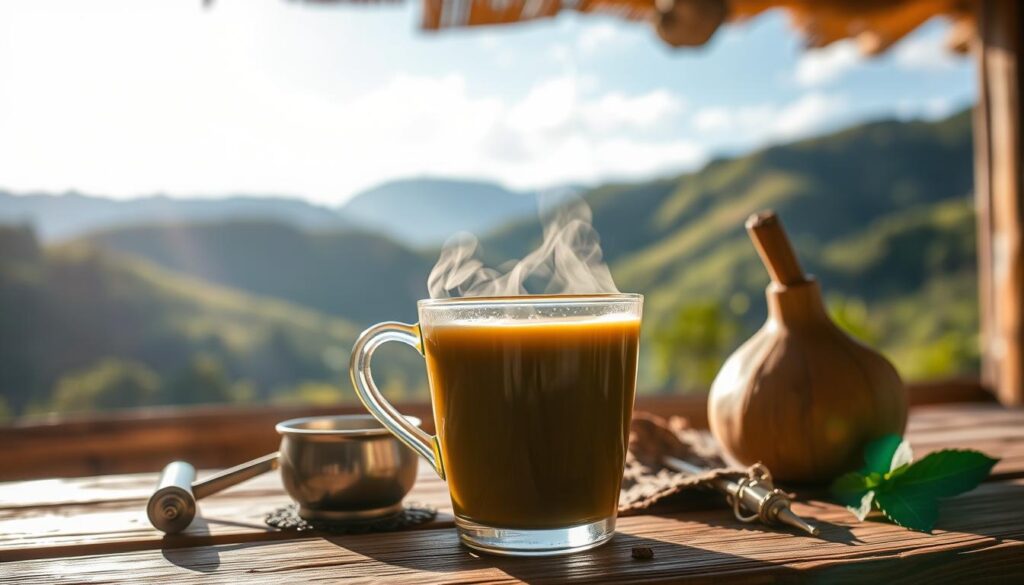Ever wondered why an old drink is now loved worldwide? It’s yerba mate, a South American favorite. It’s the third most popular caffeinated drink globally. Yerba mate is more than a drink; it’s a way to connect and feel alive.
Yerba mate comes from southern Brazil, Paraguay, Uruguay, and Argentina. It’s special to indigenous groups like the Guaranis. They enjoyed it before Europeans arrived. Today, it brings people together, from cowboys to modern fans. It’s known for its mental boost and antioxidants, making it stand out from coffee and tea.
Exploring yerba mate opens up a world of health, community, and culture. It challenges what we think about usual stimulants. Are you curious to see why this South American tea is a favorite among drink lovers?
Key Takeaways
- Yerba mate is ranked as the third most popular naturally caffeinated drink worldwide.
- Historically, yerba mate has been consumed by gauchos and soldiers, serving as a vital dietary supplement.
- The beverage fosters strong social connections through its custom of communal sharing.
- Yerba mate boasts possible health benefits, including better mental focus and antioxidants.
- Countries like Uruguay consume the most yerba mate per capita despite not cultivating the plant.
- Preparation methods vary, incorporating cold water or herbs in warmer climates for refreshing variations.
Introduction to Yerba Mate
Yerba mate is a favorite drink in South America, loved in places like Argentina, Brazil, and Paraguay. It’s known for its energizing effects and rich tradition. This makes it the third most popular natural stimulant worldwide.
The culture around yerba mate is all about sharing and rituals. It brings people together, making every sip special.
Yerba mate’s importance goes beyond its history. It’s celebrated in modern times too, like when Argentina won the 2022 FIFA World Cup. Players enjoying yerba mate showed its role in cultural celebrations.
Today, yerba mate is enjoyed in more places, including the Middle East and North America. Its journey from Indigenous communities to global popularity is fascinating. It shows how this drink has been valued for generations.
What is Yerba Mate?
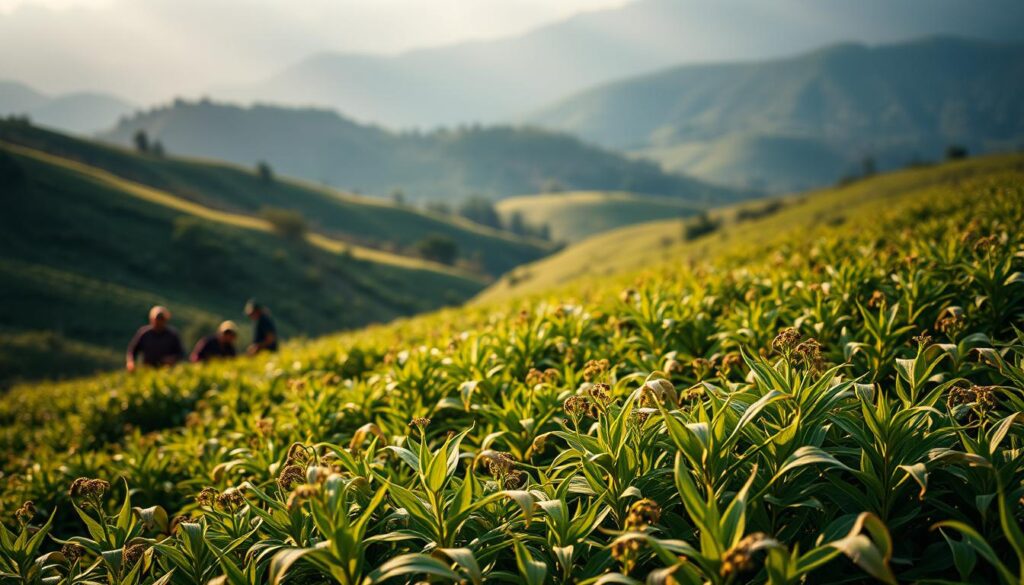
Yerba mate is a special drink with a deep history and cultural importance. It’s loved mainly in South America but has fans worldwide. People are curious about its origins and how it fits into everyday life.
Definition and Translation
Yerba mate is a tea made from the leaves and shoots of the Ilex paraguariensis tree. The name “yerba” means “herb” in Spanish, and “mate” comes from Quechua, meaning “cup.” This shows its roots and how it’s traditionally made.
Origin of Yerba Mate
The story of yerba mate starts with Indigenous cultures in South America, like the Guaranis. They made this drink before Europeans arrived. In the 1500s, Spanish colonizers spread it, making it a key part of South American life. Today, in Argentina, it’s a big part of social gatherings.
| Parameter | Details |
|---|---|
| Main Producing Countries | Argentina, Brazil, Paraguay |
| Argentina Production | ~290,000 MT (32% of global total) |
| Brazil Production | 513,256 MT (58% of global total) |
| Paraguay Production | 85,490 MT (10% of global total) |
| Caffeine Content | Milder compared to commercial energy drinks |
| Historical Significance | Popularized by Jesuits; social bonding beverage |
| Plant Lifespan | Up to 100 years |
This overview of yerba mate highlights its rich history and cultural value. Learning about it gives us a glimpse into a lively tradition that’s alive today.
Yerba Mate: A Stimulating South American Beverage
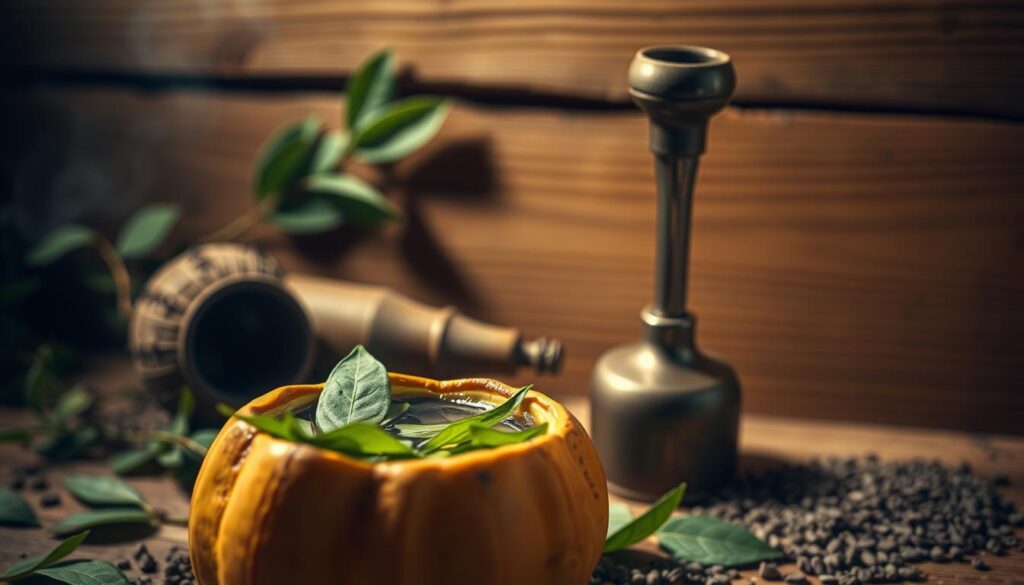
Yerba mate is the world’s third-most popular naturally stimulating drink. It has a unique taste and gives a smoother energy boost than coffee or tea. It’s very popular in Argentina, southern Brazil, Paraguay, and Uruguay.
In Argentina, drinking yerba mate is a family and friends tradition. The Argentine football team drinks it to bond and show pride. It’s more than just a drink; it brings people together at social events.
Yerba mate’s history is rich, from its Indigenous roots to global markets today. Jesuits and wars have shaped its story. It’s deeply rooted in South American culture.
Yerba mate is gaining fans in Europe and the U.S., even as a cold drink. This change shows how it’s becoming a symbol of Argentine identity. Christine Folch’s work highlights its growing popularity, like guayusa and yaupon.
Yerba mate’s history and growing popularity make it interesting. It shows how a drink can shape culture and traditions. Exploring its yerba mate stimulant properties reveals its lasting appeal.
| Region | Consumption Status | Cultural Significance |
|---|---|---|
| Argentina | High | Symbol of national identity |
| Brazil (Gaúcho region) | High | Social gatherings |
| Paraguay | Moderate | Community rituals |
| Uruguay | High | Traditional practices |
| Global (Europe & U.S.) | Increasing | New consumption trends |
The Cultural Significance of Yerba Mate
Yerba mate is more than just a drink; it’s a symbol of connection and community in South America. Drinking mate in groups is special, showing hospitality and friendship. It’s a big part of daily life and special events, showing its importance in cultural rituals.
Social Aspects of Consuming Yerba Mate
Sharing yerba mate brings people together, making conversations easy. It’s a way to bond, creating strong relationships. Passing the gourd around makes everyone feel included, showing a tradition that lasts through generations.
Social gatherings become lively, filled with laughter and deep connections. All thanks to the shared joy of drinking yerba mate together.
Yerba Mate in Traditional Ceremonies
Yerba mate is key in traditional ceremonies, celebrating important moments and unity. It’s a big part of South America’s cultural heritage. At events like weddings and festivals, mate brings people closer.
These ceremonies remind us of our shared history and identity. Yerba mate helps bring everyone together, filling the air with joy and unity.
Health Benefits of Yerba Mate
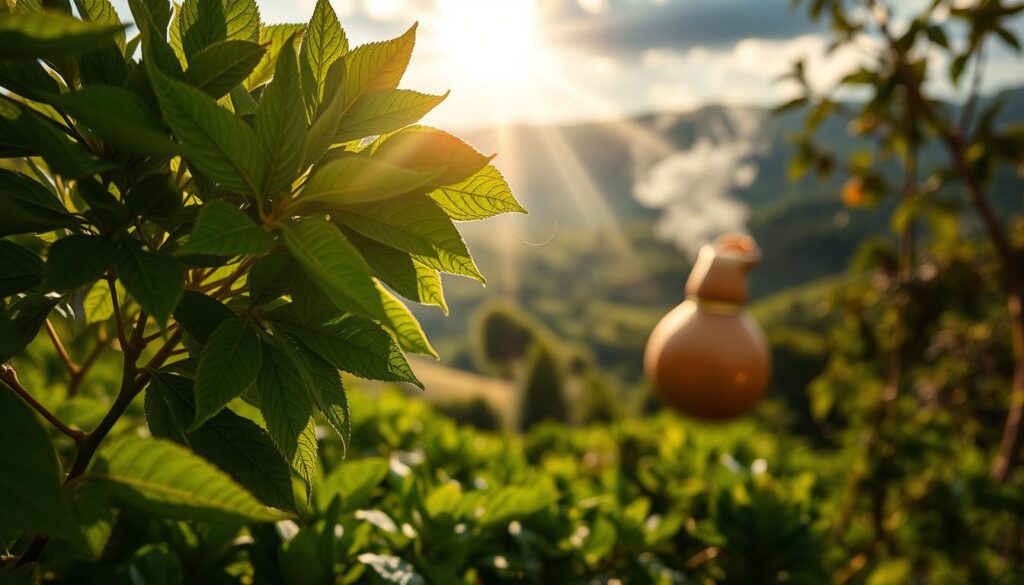
Yerba mate is known for its health benefits, making it a favorite among those who care about their health. It not only tastes unique but also helps improve well-being. This is thanks to its rich nutritional content.
Rich in Antioxidants
Yerba mate is packed with antioxidants. These compounds fight off harmful free radicals in our bodies. Drinking it regularly could help lower the risk of chronic diseases. It can make you feel more alive and healthy.
Potential for Improved Mental Alertness
Yerba mate can boost your mental alertness, perfect for those needing a pick-me-up. It contains caffeine and theobromine, which help you stay focused. A single serving has as much caffeine as a cup of coffee, great for staying alert all day.
Yerba Mate and Metabolism Boost
Studies show that yerba mate can help boost metabolism, aiding in weight loss. It may even reduce fat absorption, which could lower obesity risks. Adding yerba mate to your diet can help with weight management and is a tasty, energizing choice.
Yerba Mate vs. Other Stimulants
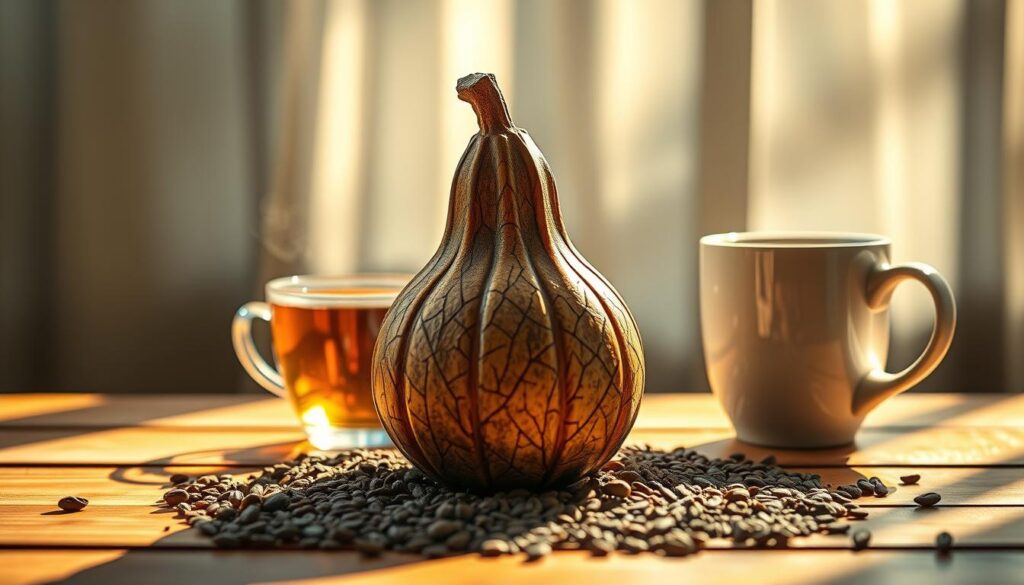
Exploring yerba mate vs coffee and yerba mate vs tea shows their unique qualities. Yerba mate offers a stimulating experience with natural stimulants. It has caffeine, theobromine, and theophylline, giving energy without the crash of other drinks.
Comparison with Coffee and Tea
Yerba mate has 1-2% caffeine, less than coffee. Yet, it energizes more and improves focus. Its caffeine is released slowly, giving energy all day.
Tea is milder, but yerba mate gives a strong kick. It boosts brain function without coffee’s jitters.
Unique Properties of Yerba Mate
Yerba mate has 90% more antioxidants than green tea. Its alkaloids improve endurance and mental performance. It also aids in muscle recovery after exercise.
Yerba mate is a refreshing alternative to traditional stimulants. It offers energy and well-being, improving your daily life.
Preparing and Consuming Yerba Mate
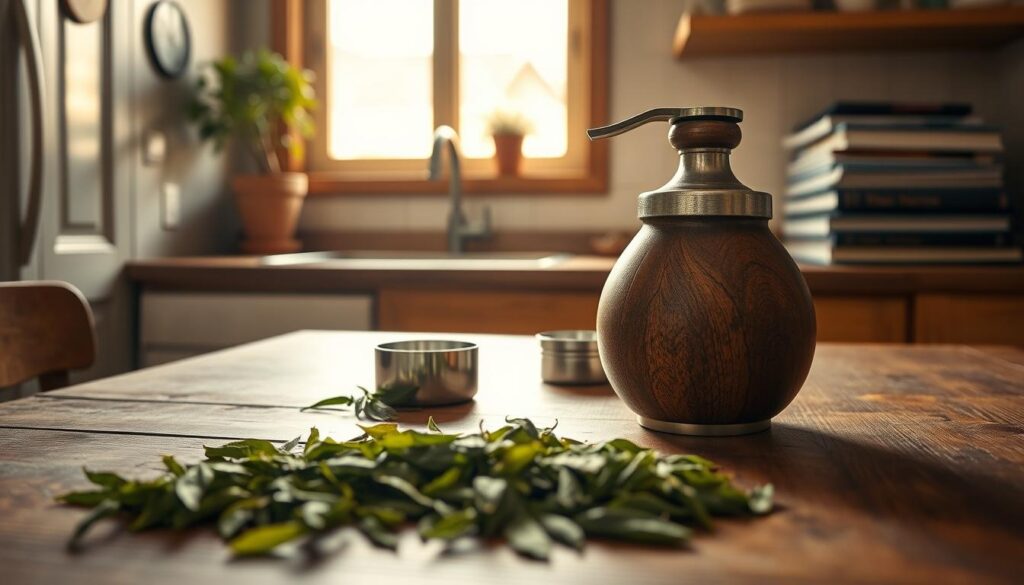
Trying traditional yerba mate shows you its cultural roots. It starts with a yerba mate gourd filled with dried leaves and hot water. Drinking it through a bombilla brings out the rich taste and tradition. Let’s dive into the rituals and methods of this ancient practice.
Traditional Preparation in a Gourd
To enjoy authentic yerba mate, follow these steps:
- Choose a yerba mate gourd, made from wood, metal, or pumpkin.
- Fill it half with dried yerba leaves.
- Make a slope in the gourd for better flavor infusion.
- Pour hot water (about 140°F/60°C) into the lower part of the slope.
- Put the bombilla in the yerba at the slope’s base; sip slowly to enjoy.
This traditional way of drinking yerba mate brings people together. It’s a cherished ritual in Argentina, Paraguay, and Uruguay.
Modern Variations of Consumption
Yerba mate is evolving, with new ways to enjoy it. Now, you can find it in tea bags and ready-to-drink formats. These changes make it easier to enjoy on the go, attracting more people in North America.
These modern options appeal to both traditionalists and newcomers. Brands like Mission offer blends for different tastes, making it simpler to prepare while keeping the essence of yerba mate.
| Preparation Method | Key Features |
|---|---|
| Traditional Gourd | Requires a yerba mate gourd, bombilla, and specific water temperature, fostering communal rituals. |
| Tea Bags | Convenient for quick preparation, allowing for single servings without special equipment. |
| Ready-to-Drink | Available in bottles, targeting on-the-go consumers, maintains connection to original flavors. |
| Blended Innovations | Includes additional flavors and supplements for enhanced effects, catering to diverse preferences. |
Exploring yerba mate can mix old traditions with new conveniences. This way, you can enjoy it in a way that fits your lifestyle.
Yerba Mate’s Stimulant Properties
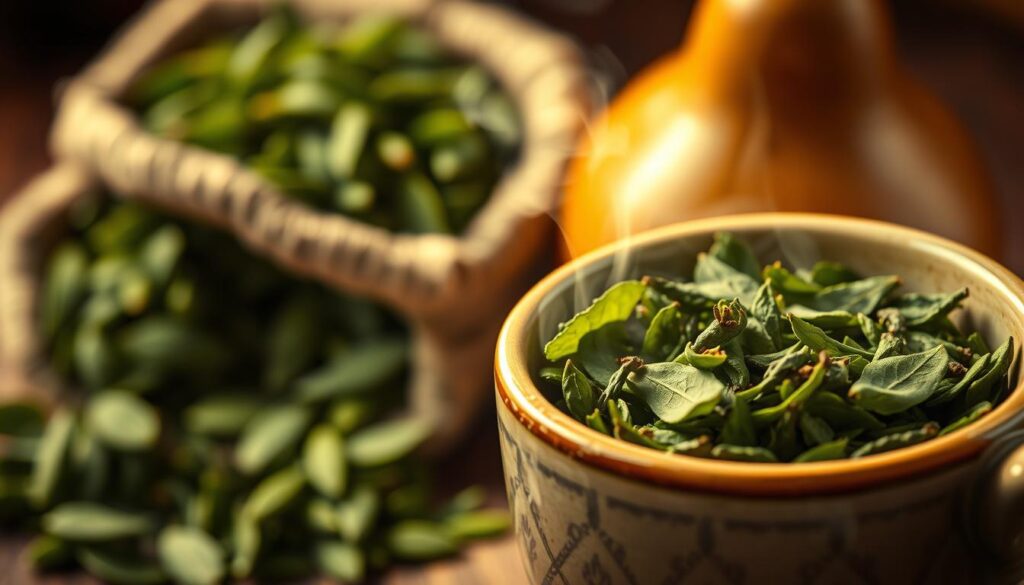
Yerba mate is known for its natural stimulants. It’s a favorite in South America, after coffee and tea. Knowing what makes it special can deepen your respect for this ancient drink.
Main Stimulants Found in Yerba Mate
Yerba mate contains caffeine, theophylline, and theobromine. Caffeine gives you a boost, like coffee. Here’s a quick look at the main stimulants:
| Stimulant | Function | Benefit |
|---|---|---|
| Caffeine | Increases alertness | Enhances cognitive function and mood |
| Theophylline | Relaxation of blood vessels | Improves blood flow and reduces stress |
| Theobromine | Stimulant and mood enhancer | Promotes feelings of happiness and relaxation |
How Yerba Mate Affects the Body
Drinking yerba mate can change how your body works. It has about 1-2% caffeine, which makes your heart beat faster and your mind sharper. Studies show it can also boost antioxidants, which is good for your health.
How yerba mate affects you depends on how much caffeine you can handle. It’s safe to drink up to 1.5 g of caffeine a day, which is what you get from yerba mate. But too much can upset your stomach or make your heart race. Exercising lightly while drinking it can help with weight loss.
Yerba Mate in Contemporary Culture

Yerba mate’s popularity has grown a lot in recent years. It’s now enjoyed in many places around the world, including Europe and North America. Its rich history and the special way it’s shared have made it popular globally.
Global Popularity of Yerba Mate
Yerba mate is the third most popular drink in the world. It’s loved in Argentina, southern Brazil, Paraguay, and Uruguay. For example, the Argentine football team drank it during the 2022 FIFA World Cup for energy and comfort.
This shows how yerba mate has become a global favorite. It’s loved by many different cultures.
Influence on Music and Arts
Yerba mate is more than just a drink. It has inspired music and art. It was part of the world’s first written tango.
It’s also featured in modern art, like puppet shows by Syrian dissidents. This shows how important yerba mate is in culture and expression.
| Country | Significance | Consumption Statistics |
|---|---|---|
| Argentina | Cultural symbol, consumed during key sporting events | Largest consumer of yerba mate |
| Brazil | Local adaptation in southern regions | Second largest consumer |
| Paraguay | Traditional community-sharing practices | Growing market presence |
| Uruguay | Integral part of daily life | Commonly consumed beverage |
| Global | Emerging interest across Europe and North America | Steady increase in market demand |
The Journey and Production of Yerba Mate
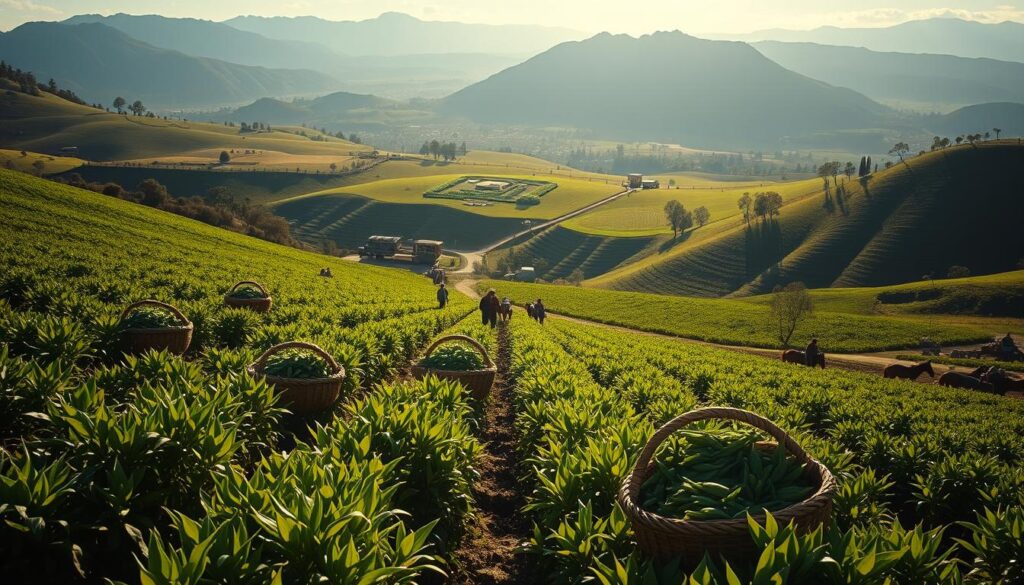
The making of yerba mate is a mix of old ways and new tech. It’s all about getting this special drink to us. Yerbateros, the experts, pick the best leaves for quality. Then, the leaves dry, which shapes the taste of yerba mate.
This process shows how much yerba mate means to culture and the economy.
Harvesting and Drying Processes
Yerba mate is picked at the right time for the best leaves. The trees, up to 30 meters tall, are carefully harvested by hand. This is hard work.
After picking, the leaves dry right away. They might dry under the sun or in a controlled space to keep the flavor.
Major Producing Countries
South America, mainly Argentina, Brazil, and Paraguay, makes most of the yerba mate. Argentina sends out over 95% of its yerba mate. This makes its yerba mate industry worth about $100 million a year.
Brazil and Paraguay also play big roles in meeting global demand. Their history and culture are tied to yerba mate production.
| Country | Key Statistics |
|---|---|
| Argentina | 95% of production exported; estimated market value of $100 million annually |
| Brazil | Cultivates yerba mate on approximately 50,000 hectares; significant agricultural contributor |
| Paraguay | Notable consumer patterns; demographic insights from Instituto Nacional de Estadística |
Potential Risks and Precautions
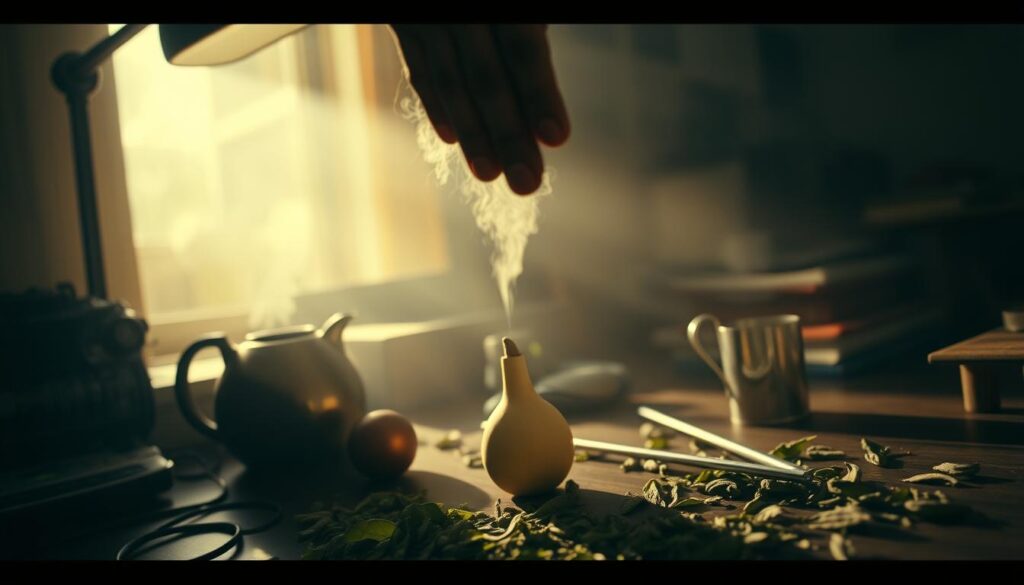
Yerba mate has many health benefits. But, it’s important to know the risks, like its effect on heart health and how it interacts with medications. Knowing these risks helps you make smart choices about drinking it.
Increased Heart Rate and Blood Pressure
Drinking yerba mate can make your heart rate and blood pressure go up. This is more likely if you’re sensitive to caffeine. Drinking a lot, over 10 cups a day, can increase these risks even more.
It’s key to watch how much you drink. Your body’s reaction to yerba mate can change based on how much caffeine you consume. Too much caffeine can make you feel jittery, anxious, and even worsen health problems.
Possible Interaction with Medications
Yerba mate can interact with some medications, like those for heart issues and antibiotics. The caffeine in yerba mate can make side effects worse. This might cause more jitteriness, headaches, or even serious heart problems.
If you’re taking medication, talk to your doctor before drinking yerba mate. Knowing how yerba mate and medications interact can help avoid bad effects and ensure it’s safe to drink.
Yerba Mate Recipes to Try
Yerba mate recipes open a world of flavors. You can enjoy it in many ways, from hot brews to cold drinks. Each experience is unique.
For a classic preparation, follow these simple steps for a traditional yerba mate infusion:
- Start with approximately 2 tablespoons (10 grams) of dried yerba mate.
- Fill your gourd or cup halfway with yerba mate leaves.
- Gradually add water heated to 160-180°F (70-80°C) to preserve the flavors.
- Sip through a bombilla (a metal straw) and enjoy the communal aspect by passing the gourd around.
Try exciting seasonal variations like:
- Iced Yerba Mate: Steep yerba mate for at least 4 hours or overnight in the refrigerator for a refreshing summer drink.
- Citrus Punch: Mix chilled yerba mate with fresh fruit juices like orange or lemon for a vibrant beverage.
Yerba mate in your recipes adds health benefits. It has more antioxidants than green tea. It boosts energy, mental clarity, and digestive health.
Exploring yerba mate recipes is fun. It tastes great and boosts your well-being. Get creative and enjoy the many sides of yerba mate cuisine!
Conclusion
Yerba mate is a traditional drink from Argentina, Paraguay, and Uruguay. It shows the rich culture of the Guarani tribes. It’s also a symbol of social connection today.
Preparing yerba mate is special. It’s made from the ilex paraguariensis plant. This way, its aroma and nutrients are kept for the best taste.
Yerba mate has many benefits. It’s full of antioxidants and has caffeine and theobromine. These help you stay alert without the jitters coffee can give.
It’s safe for healthy adults to drink in moderation. Drinking 1 to 3 cups a day can be a nice part of your day. But, think about your health before drinking it.
Yerba mate is more than just a drink. It brings tradition and health benefits together. Whether you try it in a café or on International Mate Day, it’s worth exploring.

